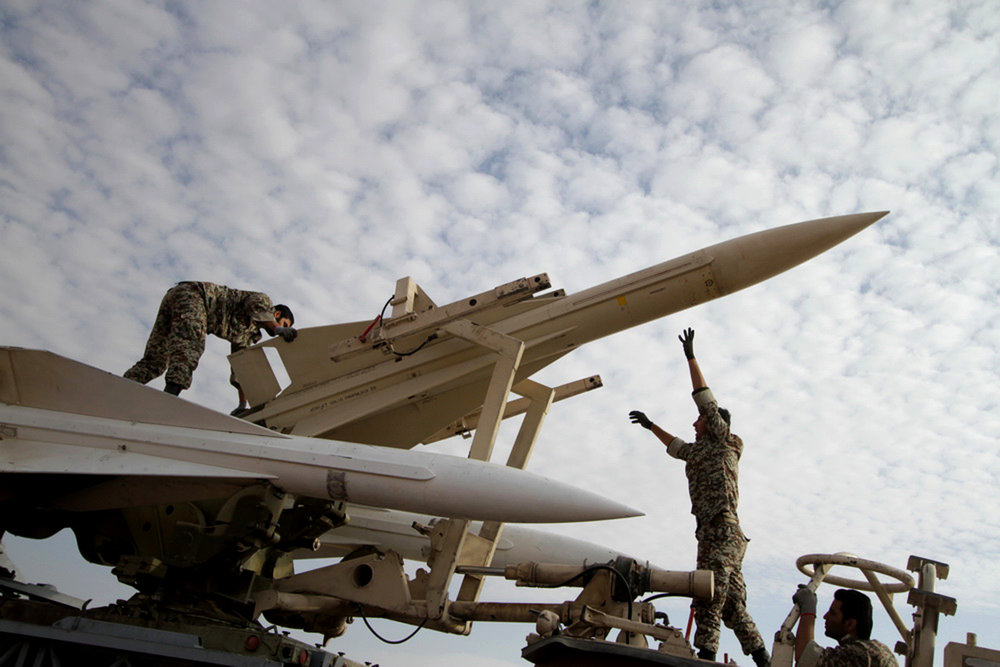West missile policy against Iran

TEHRAN _ Over the last few weeks, we have been witnessing the West making media and political tensions over Iran’s missile capabilities. This has been soared when ISIS came to an end in Iraq and Syria which means a great failure for the West. In a controversial speech delivered by Donald Trump as saying, Iran’s missile program as one of the pre conditions of the agreement should be on the table If the nuclear deal is due to remain. On the other hand, Macron the France president has expressed his concerns over Iran growing missile capabilities and called for a consensus to negotiate this issue.
Apparently, there has been a share of work among the West officials to counter Iran missile program. Thus, there are some crucial points needed to be cared more.
1: In the United Nations general assembly sidelines held every year in New York, Donald Trump met his French counterpart last September, mainly talking about Iran missile program and France adopted to put more pressure on Tehran to convince this country to negotiate its missile program. In fact, the French side had asked for negotiation over Iran missile program before this meeting was held. As a result, following the meeting, there has been a steady and progressive pressure on Iran by France to open up talks over its missile capabilities.
Emmanuel Macron has even accused Iran of equipping AnsarAllah with missiles launched on Riyadh. Under this pretext, he designated Iran’s missile program a potent threat in the Middle East. Thus, France recent positions against Iran cannot be incidental and there must be a shared plot between Trump and Macron.
2:During the nuclear talks going on between Iran and 5+1 powers in Geneva, Laurent Fabius France erstwhile foreign minister ,who is taught to have acted like a bad police officer, even once prevented the two sides from achieving a temporary agreement. In the current juncture Trump has turned the deal to Macron to handle like the one Fabius did. However, there is a significant difference now. No negotiation exists on the deal and surely it will not in future.
Some news agencies revealed that Trump has offered Macron some promises regarding Iran’s deal. One these promises is taught to be regarding Paris climate deal to be reviewed. Nevertheless, French officials are constantly emphasizing that the climate deal is never affiliated with their foreign policies. But Washington and Paris do not have a various outlook toward the current events in their foreign policies.
3: During the nuclear negotiations being held between 2014 - 2016, the U.S. erstwhile secretary of State John Carry had urged to put Iran’s missiles capabilities on the table and attach it as a term to JCPOA. It is surprising to know that the talks in Muscat reached a standoff only due to the Americans being too ambitious over Iran’s missile program. Richard Nephew one of the U.S. administrations negotiating team members in Obama's government, who is said to be the U.S. sanctions architecture against Iran, has recently stated that in the time of negotiation when U.S. faced a failure opted to back down from its position.
However, he made a statement regarding Iran as saying he believes they can reopen talks over Iran’s number of missiles and its warheads. Accordingly there is a consensus among Democrats and Republicans to counter Iran’s missile program. Almost a month ago The House of Representatives approved a bill as to say "International sanctions and implementing a law against Iran missile program”.
Most notably, the majority of Democrats accompanied Republicans in the House and even none of them opposed to the approved bill.
4: Standing against Iran’s missile program is not as complicated as it taught to be. The united states along with the European Troika to counter Iran’s missile program, have entered a game to trade over it.
Washington and Paris are the two leading players of this game. Furthermore, London and Berlin have both shown a green light to them in advance. Thus, there is a consensus between Washington and the European Troika. However on the surface there seems to exist a disagreement between the U.S. and its allies. Trump believes that Iran’s missile capabilities as a term needs to be touched on into JCPOA.
But the European troika and the U.S. democrats insist on achieving a second separate deal over Iran’s missile program. Boris Johnson the UK foreign minister along with his German counterpart respectively warned the U.S. officials that making a change in JCPOA through adding an amendment will be impossible. Even individuals such as Rex Tillerson the U.S. secretary of state also agreed with this view point. However, some US senators like Tom Cotton and politicians such a Niky Hally strongly opposed with it.
5: The U.S. dissent and European troika on how to counter Iran’s missile program, basically does not matter for Iran. So, not only the nature of this issue but also its surface should not prevent our diplomacy system from paying too much attention to it. What is inevitable is that the only way to neutralize any of U.S. and its allies measures lies in opposing with any possible talks regarding our missile capabilities. Besides, we need to ameliorate our defense power more. European troika should also be blamed for colluding with the U.S. by our foreign ministry.
